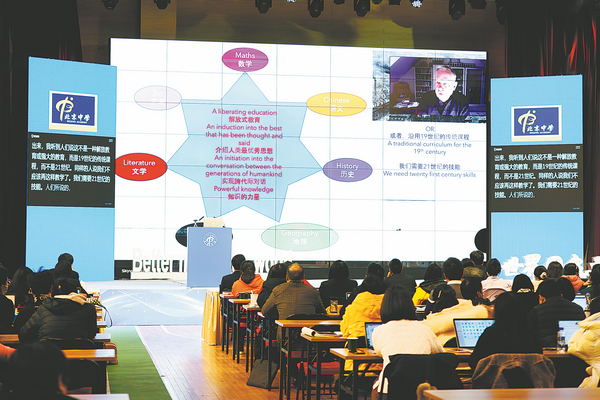

Beijing, China's culture hub with the largest number of top-notch education institutions, has been making increasing efforts to enhance both teaching quality and global vision for its K12 education to better prepare the city's youth to face the uncertainty in the world with more confidence.
As a key driver to synergize international education know-how with the city's education authorities and experts, the 8th Beijing Academy Seminar under the theme of "designing the ideal future school" was held in Beijing in late December.
The event pooled together government officials, K12 education practitioners and experts, both online and in person, from China, the United Kingdom, New Zealand, the United States and the Organization for Economic Cooperation and Development to share their views and insights on the building of future schools, innovative talent and quality teaching.
"Education authorities and schools should provide more choices with abundant supplies for students, in order to make sure that they can get enough high-quality resources to further develop their strength," said Li Yi, spokesperson of Beijing Education Commission, when addressing the seminar.
He analyzed Beijing's education policies by presenting detailed explanations and examples showing how the city reallocates school resources and services to cater to the higher quality demands of the students.
The municipal government recently announced it will establish an online platform where all high school teachers can provide courses to all students in the city, which is supposed to shatter the physical borders among schools and help students in remote areas gain access to top-quality educational resources.
Meanwhile, under the guidance of the Ministry of Education, Beijing education authority required all primary and junior high schools to cut the homework burden of their students and provide better after-school services for them between 3 pm and 6 pm.
This is part of a broader nationwide campaign to implement a guideline issued by the general offices of the Communist Party of China Central Committee and the State Council. The guideline, commonly known as "double reduction", aims to reduce homework and after-school tutoring pressure and further cut academic workload for primary and middle school students, in general, making K12 education more student-oriented.
Beijing Academy, a leading Chaoyang district-based public school where the seminar was held, has been actively implementing and practicing such student-oriented teaching philosophy since its founding in September 2013.
The school offers full K12 courses with an emphasis on K7 to K12, preparing students with the key qualities, merits and competences they need for their pursuit of academic excellence at domestic or overseas universities and, most importantly, for their future lives.
Xia Qingfeng, principal of Beijing Academy, said at the seminar that it's the academy's persistent pursuit of making no social distinctions in teaching, while teaching students in accordance with their aptitude, and the emphasis on the unity of knowledge and action that make the academy a true "home" for students both physically and psychologically.
"We need to keep a balance between ideal and reality, innovation and inheritance, freedom and rules, teaching and learning," he stressed. "We should also increase our power of tolerance, so as not to require the same from different students."
Beijing Academy has created a space where all students can enjoy what they are interested in and good at during their school time, he said. Meanwhile, the school has kept an open attitude toward all resources outside the campus for their across-the-board development.